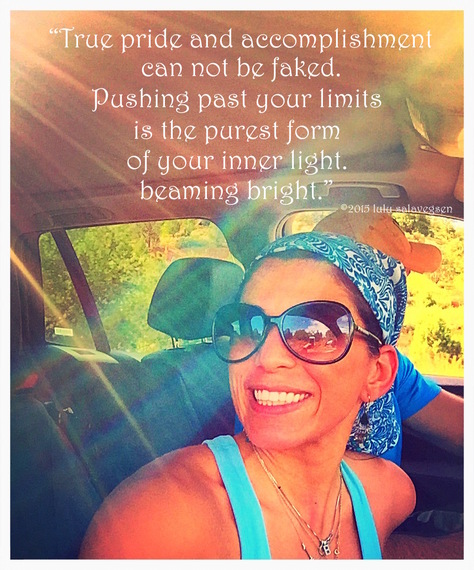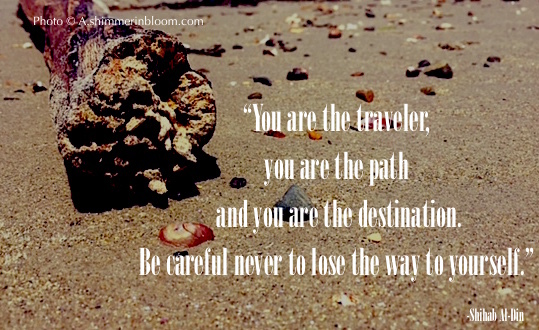Continued from Expectations -- Part 1: Attachment to Outcomes Kills Magic."
I used to have a boyfriend in my 20s who was 15 years my senior. He would always say, "We need to just manage expectations." I bought into it for a long time... I thought, yes. If we make expectations clear, then all will be clear. Wrong.
I think he was onto something, but not quite ready or able to articulate what he wanted to say in the relationship. I now understand that the best possible way to deal with anything and everything in life: "Have NO expectations."
So many people see this as a negative. It's understandable to see that because it may it sound like: "I will LOWER my expectations of you, or this situation or this relationship to make it tolerable." That is true in some sense, but it is also untrue.
I see letting go of expectations as a gift of freedom to the universe to do what it does anyway. Nothing really goes according to plan when we try too hard to control, grip and manage it. It is only when the hold is loose, the mind is calm and the energies around us are flexible and malleable that the unthinkable just may happen. It's the boy scout of life. "Be prepared." But I would add to it. "Be prepared for anything, but expect nothing and flow with whatever is meant to be with full trust." That's that.
It seems simple. Most people could probably argue a million different reasons as to why it's impossible or that the world would fall into complacency and non-action and nothingness. I say the exact opposite.
Imagine if there were no limiting beliefs due to expectations? I expect that if I go to the doctor every year I won't get sick. No... You may get cancer and be very angry and not understand why and get bitter because you "did everything right."
Or you may change the perspective just a smidgen by thinking I go to the doctor because it feels good to keep in check of my health. I don't expect it to that it negates all possibilities of me falling, instead I trust that my job is to value my gift of life and health and I shall maintain it. That is my intention. There are no conditions or circumstances from which I believe I am free or safe from harm, but I also equally believe that there are no conditions that stop me from living the most full and healthy life imaginable. Either are possibilities, and I flow with what will come.
Same goes for a partner in a relationship. I have spent nearly two decades trying to master how to set, maintain and deal with love expectations and the changing of who we are and how we deal with each other. It is silliness as I look back.
It's a trick bag for me as I am creative and extreme and goofy. I have been known in many relationships to write surveys and questionnaires for anniversaries like a business would have a review. I make them playful and fun. I like to set goals and keep a pulse on where we are. I like the idea of saying those things we find perfectly acceptable to say in work, jobs, and other agreements, but we rarely if ever do it in relationships.
Why don't we ask: "What could I do better?" How does_______ make you feel?" "What recent changes have you noticed and what do you find beneficial about them, or is there something that has been less so?"
These to me are incredible ways to learn about each other and to stay the course with how two people evolve or dissolve or merely get stagnant or lost or incredibly motivated to carry on. All of those things happen, and should if one is truely living.
People die. Jobs are lost and babies are born. New discoveries lead to new truths, yet we don't check in with the other? Not deeply anyway. It's more of a date-night dinner of conversations that don't make us uncomfortable or tired or bring up stuff we "cant deal with tonight." Because work was long, or we have a headache, or we're in a good mood so let's not ruin that?
Is this based on some expectation of where we would end up if we truly talked about how we feel? I'll say this... I've never met a person that didn't want to talk about himself or herself when truly being listened to. The environment must feel safe, and the listener can't attack or blame, but when someone feel heard, they are open to letting go of controls and expectations.
I always say:
"All it takes is one person to disarm, and the white flags fly up faster than you can get your own accountability on display."
That's a huge defining point of any relationship. Friendship, marriage or siblings can all benefit from believing and understanding that fact.
How many times have you been in an argument in the heat of a moment and got to an impasse and just stopped. That is when we start to just hold onto our ground. The ego takes over, the negative rhetoric and the need to feel right or meet whatever expectation we had in advance of that debate overwhelms.
The thing is, nothing is gained at all. Only resentment, fear of sharing, anger, and so many other negative emotions start to build and fester. How many times have you been pretending to still be angry or rubbed wrong about something you realized later was not worth the effort? Too many, I know. It's in that moment where one of you makes the call, writes the text, gives the hug, starts to cry, cracks a joke, or somehow diffuses the negative combative energy by laying ego and the attachment to a certain outcome aside.
When this happens it is like the entire room or space between you clears and fills with freshness, relief and beauty. This is intimacy, and this is connection. It is what makes love possible.
It is the entire basis for all things that gravitate us towards each other. No one wants to stalemate. No one wants to sit in anger or disappointment in someone else. Even if we don't want to agree, there are a multitude of other options. We can say simple things (without sarcasm):
"I really do understand now, how you might feel that way. I'm sorry I was being so stubborn. We don't have to agree on the point, but we don't have to let this one disagreement take over all the other things we are to each other."
That's the point. When one person disarms, the ability to surrender your attachment is so much easier. We mirror each other. We do it physically and psychologically. Someone gets pissy with you, you find your reaction typically is to return the "favor." That's attachment to what they've done and assuming it has anything to do with you.
What if it ISN't personal?
Explore this "taking it personally" side of it in "Expectations -- Part 3: Don't Attach and You Won't React."

